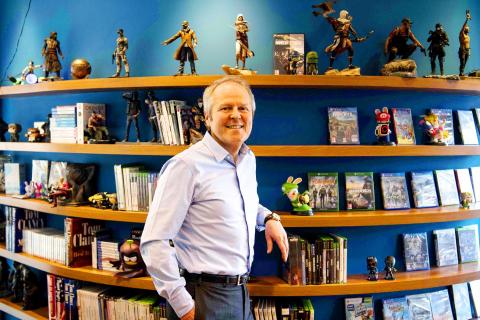Fresh from winning a long corporate battle, French video game powerhouse Ubisoft is aiming for a 10-fold surge in its global playing audience after securing a partnership with Chinese Internet giant Tencent Holdings Ltd (騰訊).
“Within 10 years, Ubisoft wants to reach 5 billion players” who have taken up the challenge of at least one of its games, compared with the 500 million it has now, Ubisoft chief executive Yves Guillemot said in an interview.
Speaking at the company’s offices in Montreuil, France, Guillemot made no secret of savoring his victory against Vincent Bollore, the French chairman of Vivendi who has a long history of corporate raiding.

Photo: AFP
In 2015, Vivendi began acquiring shares in the publisher of hit titles such as Assassin’s Creed and Far Cry, threatening the Guillemot family’s control of Ubisoft since they no longer owned a majority stake, but last month Vivendi bowed out, selling its 27.3 percent stake in a 2 billion euro (US$2.5 billion) deal that saw Tencent come in.
“As soon as they expressed their desire to leave, we brought them a solution, with partners who wanted a stake,” said Guillemot, who nonetheless said the battle with Vivendi had an upside. “With our strategy for creating value, we proved that we didn’t need anyone and that they were not going to bring any added value.”
When the deal was signed “there were some nice parties here,” Guillemot said, though he was in the US at the time.
Tencent, which operates WeChat, is the nation’s leader in social media and gaming.
Guillemot said China had an “incredibly vibrant” PC gaming market and huge potential for smartphone gaming.
Ubisoft had already signed a deal with Tencent last year to develop Might and Magic: Era of Chaos, which has generated Chinese sales of more than US$100 million.
Ubisoft is also betting on the growing popularity of e-sports, hoping to organize more live gaming competitions.
“The goal is to be in the top five of the most-watched games,” with titles such as Rainbow 6, For Honor and Just Dance, Guillemot said.
The five-year deal with Tencent, which got no seats on the Ubisoft board and said it would not raise its stake, offers some protection from further shareholder battles, after Vivendi and before that Electronic Arts Inc in 2004.
The company’s ambitious target of 5 billion players is also based on both hardware and software innovations that are expected to sweep through the industry.
“In 10 years, handsets will be much more powerful,” with smartphones capable of exceeding current standalone gaming consoles such as the PlayStation, Guillemot said.
With more people playing via cloud computing, Ubisoft would be able to deliver its games to TVs, smartphones and even self-driving cars.
“It’s going to make our games available on the majority of screens,” Guillemot said. “The trick will be to create games that are adapted to these new technologies, with themes that speak to everyone.”

With an approval rating of just two percent, Peruvian President Dina Boluarte might be the world’s most unpopular leader, according to pollsters. Protests greeted her rise to power 29 months ago, and have marked her entire term — joined by assorted scandals, investigations, controversies and a surge in gang violence. The 63-year-old is the target of a dozen probes, including for her alleged failure to declare gifts of luxury jewels and watches, a scandal inevitably dubbed “Rolexgate.” She is also under the microscope for a two-week undeclared absence for nose surgery — which she insists was medical, not cosmetic — and is

CAUTIOUS RECOVERY: While the manufacturing sector returned to growth amid the US-China trade truce, firms remain wary as uncertainty clouds the outlook, the CIER said The local manufacturing sector returned to expansion last month, as the official purchasing managers’ index (PMI) rose 2.1 points to 51.0, driven by a temporary easing in US-China trade tensions, the Chung-Hua Institution for Economic Research (CIER, 中華經濟研究院) said yesterday. The PMI gauges the health of the manufacturing industry, with readings above 50 indicating expansion and those below 50 signaling contraction. “Firms are not as pessimistic as they were in April, but they remain far from optimistic,” CIER president Lien Hsien-ming (連賢明) said at a news conference. The full impact of US tariff decisions is unlikely to become clear until later this month

GROWING CONCERN: Some senior Trump administration officials opposed the UAE expansion over fears that another TSMC project could jeopardize its US investment Taiwan Semiconductor Manufacturing Co (TSMC, 台積電) is evaluating building an advanced production facility in the United Arab Emirates (UAE) and has discussed the possibility with officials in US President Donald Trump’s administration, people familiar with the matter said, in a potentially major bet on the Middle East that would only come to fruition with Washington’s approval. The company has had multiple meetings in the past few months with US Special Envoy to the Middle East Steve Witkoff and officials from MGX, an influential investment vehicle overseen by the UAE president’s brother, the people said. The conversations are a continuation of talks that

CHIP DUTIES: TSMC said it voiced its concerns to Washington about tariffs, telling the US commerce department that it wants ‘fair treatment’ to protect its competitiveness Taiwan Semiconductor Manufacturing Co (TSMC, 台積電) yesterday reiterated robust business prospects for this year as strong artificial intelligence (AI) chip demand from Nvidia Corp and other customers would absorb the impacts of US tariffs. “The impact of tariffs would be indirect, as the custom tax is the importers’ responsibility, not the exporters,” TSMC chairman and chief executive officer C.C. Wei (魏哲家) said at the chipmaker’s annual shareholders’ meeting in Hsinchu City. TSMC’s business could be affected if people become reluctant to buy electronics due to inflated prices, Wei said. In addition, the chipmaker has voiced its concern to the US Department of Commerce